By Roger Baxter
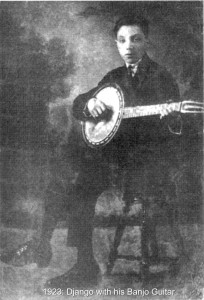
There is no reason to believe that Django Reinhardt was a particularly unlawful individual. We do know that he boasted of teaching Babik to shoplift and according to Stephane Grappelli, he was very adept at catching and wringing the necks of chickens on country walks, but these could leniently be considered only relatively minor misdemeanours. He was much too interested in music, women and gambling to be heavily involved in any major criminal activity although it has been claimed that he often cheated at billiards and cards. Despite such indiscretions, I do not think he should be viewed as a thief in the classic sense but more a somewhat eccentric man whose upbringing gave him a very flexible attitude to possessions. There are many stories of people "loaning" something to Django and never seeing it again. 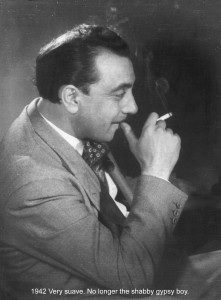 As early as 1925, a shabbily dressed young gypsy entered a bar with a damaged banjo looking for a gig. The band leader felt sorry for him, repaired his banjo, and let him borrow one of the waiter’s dinner jacket and trousers so he would look presentable enough to play. At the end of the second night, having performed brilliantly, Django disappeared with the repaired banjo and the dinner jacket and trousers and was not seen again. The epilogue is that 17 years later in 1942, Django had a gig in the area and returned to the bar. As soon as he arrived, he asked to see the band leader again. This time he was wearing a white suit, red socks, pale blue shoes and looked absolutely immaculate. He said he was very hungry so they made him some food which he ate in the kitchen with everybody excitedly crowding round. Having eaten their food and basked in their admiration, he abruptly left and they never saw him again. It may well be that Django perceived no problem in "borrowing" other people’s possessions but he was equally as ambivalent about giving away the things he owned. We can only speculate as to how many Selmers he briefly owned before indiscriminately passing them on to "family" or admirers as the fancy took him. Other possessions and money moved through his fingers equally as easily. One minute he would be living in a chic apartment in Montmartre and the next, in a shabby caravan on what resembled a bomb site. In both, he was equally happy because possessions in their simplest sense did not really mean that much to him: their value was merely in the status they gave him which was primarily symbolic and only transitory. Django was not a saint but he did not actively set out to swindle, intimidate, racketeer or steal. The same cannot be said for his friend Pierre Joseph "Baro" Ferret (or sometimes Ferré).
As early as 1925, a shabbily dressed young gypsy entered a bar with a damaged banjo looking for a gig. The band leader felt sorry for him, repaired his banjo, and let him borrow one of the waiter’s dinner jacket and trousers so he would look presentable enough to play. At the end of the second night, having performed brilliantly, Django disappeared with the repaired banjo and the dinner jacket and trousers and was not seen again. The epilogue is that 17 years later in 1942, Django had a gig in the area and returned to the bar. As soon as he arrived, he asked to see the band leader again. This time he was wearing a white suit, red socks, pale blue shoes and looked absolutely immaculate. He said he was very hungry so they made him some food which he ate in the kitchen with everybody excitedly crowding round. Having eaten their food and basked in their admiration, he abruptly left and they never saw him again. It may well be that Django perceived no problem in "borrowing" other people’s possessions but he was equally as ambivalent about giving away the things he owned. We can only speculate as to how many Selmers he briefly owned before indiscriminately passing them on to "family" or admirers as the fancy took him. Other possessions and money moved through his fingers equally as easily. One minute he would be living in a chic apartment in Montmartre and the next, in a shabby caravan on what resembled a bomb site. In both, he was equally happy because possessions in their simplest sense did not really mean that much to him: their value was merely in the status they gave him which was primarily symbolic and only transitory. Django was not a saint but he did not actively set out to swindle, intimidate, racketeer or steal. The same cannot be said for his friend Pierre Joseph "Baro" Ferret (or sometimes Ferré).
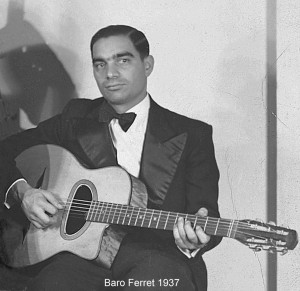
The gypsy community is very tight-lipped about one of their own who strayed as far from the straight and narrow as Baro Ferret and that reticence makes it is difficult to be absolutely sure about his activities. One thing we can be certain of though is that he was, as Emmanuel Soudieux once described him, "a gangster". He was more a gangster than a guitarist. He was a man you certainly did not want to mess with. If you had something he desired, it was made very clear to you that it was going to be his regardless of any reluctance you may have to part with it and, consequently, it would be in your best interests to simply give it to him. Having said that, I do not believe Baro Ferret was necessarily gratuitously or ruthlessly violent but he would be prepared to use force to achieve his "business" objectives when he felt it was required. 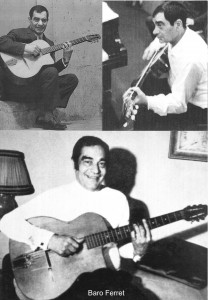 His temper was famously quixotic. Alain Antonietto said "Django’s heart was good but Baro did not have one". The nature of Baro’s activities are illustrated by the fact that when he once asked Jo Privat to head up a new bar venture for him, probably because Privat did not have a criminal record, the latter declined as he considered it too dangerous. He felt there were "…. too many murders in this business". It has been claimed that Baro Ferret was, for a while, the most successful pimp in Paris and there is no doubt whatsoever that he was a pimp, however successful. He was probably involved in the black market during the war and is best described in the language of the day as a racketeer.
His temper was famously quixotic. Alain Antonietto said "Django’s heart was good but Baro did not have one". The nature of Baro’s activities are illustrated by the fact that when he once asked Jo Privat to head up a new bar venture for him, probably because Privat did not have a criminal record, the latter declined as he considered it too dangerous. He felt there were "…. too many murders in this business". It has been claimed that Baro Ferret was, for a while, the most successful pimp in Paris and there is no doubt whatsoever that he was a pimp, however successful. He was probably involved in the black market during the war and is best described in the language of the day as a racketeer.
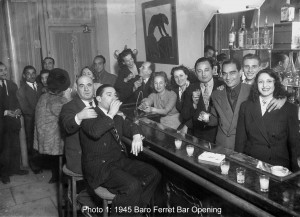
In 1945, Baro opened a bar in Paris (there are differing views as to which one it was) and the launch was caught on camera. In the first photo we see his musical gypsy friends on the left and his gangster friends, who may well have been gypsies too, on the right. Far left, almost out of shot, is Django Reinhardt and next to him is Eugene Vees. Another of the Ferret clan, Sarane, is almost hidden to the immediate right of Vees. Third from right is the star of the event Baro Ferret and behind him two of his gangster backers. Baro’s girlfriend here is thought to be a singer and she does look a little like Lucienne Delyle but that is pure conjecture. However, I do think it is possible that the bald headed man sitting at the bar looking directly into the camera is 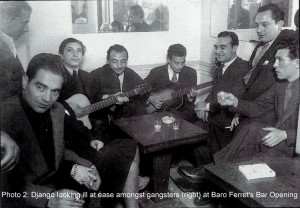 Gusti Malha. It is most unusual for Django not to be at the centre of the action when amongst his gypsy friends and followers yet here he is a peripheral figure apparently keeping out of the spotlight. Is that merely a moment in time caught by the camera or is it significant? The second photo seems to confirm Django’s lack of desire to be too close to Baro’s underworld friends as he is sitting "protected" and seemingly not particularly happy between his son Lousson and Sarane Ferret. He is not even playing the guitar when other gypsies are and that is completely unprecedented. So perhaps Django was not really involved with Baro’s "business associates" but simply there to support his friend. The third picture, however, seems to undermine that scenario totally because Django is standing talking happily to one of the men who was almost certainly part of Baro’s criminal entourage. Furthermore, the photograph is signed by Django who has written "For my friend
Gusti Malha. It is most unusual for Django not to be at the centre of the action when amongst his gypsy friends and followers yet here he is a peripheral figure apparently keeping out of the spotlight. Is that merely a moment in time caught by the camera or is it significant? The second photo seems to confirm Django’s lack of desire to be too close to Baro’s underworld friends as he is sitting "protected" and seemingly not particularly happy between his son Lousson and Sarane Ferret. He is not even playing the guitar when other gypsies are and that is completely unprecedented. So perhaps Django was not really involved with Baro’s "business associates" but simply there to support his friend. The third picture, however, seems to undermine that scenario totally because Django is standing talking happily to one of the men who was almost certainly part of Baro’s criminal entourage. Furthermore, the photograph is signed by Django who has written "For my friend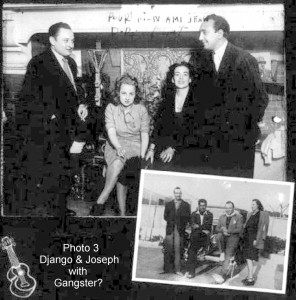 Jean". The smaller, overlaid picture shows Django and Joseph Reinhardt with the same man and one of the women from the launch photographs. They appear to be in a relaxed, casual, almost holiday environment. Also, there is a photograph of Django holding a trumpet taken in 1939 which is usually cropped to only show Django, Charles Delaunay and Naguine. The full picture, however, includes two rather suspicious characters on the right, one of whom looks very much like the gangster "Jean" in the Baro’s bar shots. Should we conclude then that Django was close to these people or was he just accepting that he had to rub along with them in the same way as American jazz musicians did during the prohibition era with the likes of Al Capone? In some ways, Django may have been rather gauche and childlike but he knew how to survive. He had come from incredible poverty and had the inbred cunning of a gypsy. He would have been quite relaxed about dubious ways of earning a living and been prepared to accept some of the perks an association with such activities could bring but without necessarily wishing to become involved himself. The impression generally given is that although Django could be very emotional, particularly over musical issues, he was physically a rather passive, even cowardly person and therefore hardly suited to the harsh criminal
Jean". The smaller, overlaid picture shows Django and Joseph Reinhardt with the same man and one of the women from the launch photographs. They appear to be in a relaxed, casual, almost holiday environment. Also, there is a photograph of Django holding a trumpet taken in 1939 which is usually cropped to only show Django, Charles Delaunay and Naguine. The full picture, however, includes two rather suspicious characters on the right, one of whom looks very much like the gangster "Jean" in the Baro’s bar shots. Should we conclude then that Django was close to these people or was he just accepting that he had to rub along with them in the same way as American jazz musicians did during the prohibition era with the likes of Al Capone? In some ways, Django may have been rather gauche and childlike but he knew how to survive. He had come from incredible poverty and had the inbred cunning of a gypsy. He would have been quite relaxed about dubious ways of earning a living and been prepared to accept some of the perks an association with such activities could bring but without necessarily wishing to become involved himself. The impression generally given is that although Django could be very emotional, particularly over musical issues, he was physically a rather passive, even cowardly person and therefore hardly suited to the harsh criminal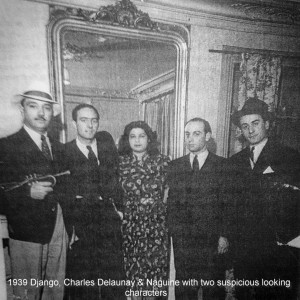 underworld. This was not always the case. On one occasion, he and Joseph had an argument at a gig and they pulled knives on each other and could only be separated by their mother. Louis Vola claims that Django would sometimes say "Come on, let’s go out. I’ve got an urge to fight" and he would drag Vola around the bistros looking for someone to fight with. This character trait is perhaps surprising but I do not think it necessarily makes Django a criminal or even criminal material. It was just a consequence of his tough, rugged gypsy upbringing which would sometimes bubble to the surface.
underworld. This was not always the case. On one occasion, he and Joseph had an argument at a gig and they pulled knives on each other and could only be separated by their mother. Louis Vola claims that Django would sometimes say "Come on, let’s go out. I’ve got an urge to fight" and he would drag Vola around the bistros looking for someone to fight with. This character trait is perhaps surprising but I do not think it necessarily makes Django a criminal or even criminal material. It was just a consequence of his tough, rugged gypsy upbringing which would sometimes bubble to the surface.
Baro Ferret, on the other hand, became totally immersed in the world of crime and as a result, spent many years in prison. He owned several bars; the two most famous being Le Baro Bar near Rue Pigalle and La Lanterne near Port de Champerret. He was rumoured to always keep a shotgun under the counter and at La Lanterne, the entrance was made deliberately narrow so people had to enter sideways and it could be easily seen if they were carrying a rifle or shotgun. According to a member of Jacques Hélian’s orchestra, there were bars in Paris especially for gypsies which were frequented by some very shady characters and where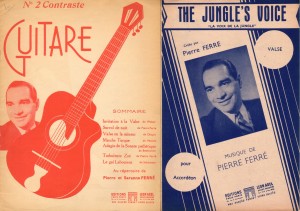 non-gypsy musicians or cliental were not welcome. It may well be that Baro ran one such bar although he does appear to have been a major player in the Parisian underworld generally, not just gypsy circles. There are reports that he was powerful enough to be involved in settling gang turf wars. There were some major battles between French and Corsican gangsters in the 1930s with the latter gradually controlling more and more of the Paris night life. The clubs and bars they "bought" were then turned into strip-tease joints heavily involved in prostitution and drugs. In order for an entertainment establishment to be able to survive in the war, it needed protection from the criminal underworld and from the Germans, both the Corsican and French gangsters often working together with the French Gestapo. Interestingly, Rue Frochot was one of the Corsican gangster’s strongholds and Django lived nearby for a while in the rather more exclusive Avenue Frochot. However, the reason Django moved there was apparently nothing to do with gangsters but because it was close to métro Pigalle, considered to be the "safest" bomb shelter in Paris.
non-gypsy musicians or cliental were not welcome. It may well be that Baro ran one such bar although he does appear to have been a major player in the Parisian underworld generally, not just gypsy circles. There are reports that he was powerful enough to be involved in settling gang turf wars. There were some major battles between French and Corsican gangsters in the 1930s with the latter gradually controlling more and more of the Paris night life. The clubs and bars they "bought" were then turned into strip-tease joints heavily involved in prostitution and drugs. In order for an entertainment establishment to be able to survive in the war, it needed protection from the criminal underworld and from the Germans, both the Corsican and French gangsters often working together with the French Gestapo. Interestingly, Rue Frochot was one of the Corsican gangster’s strongholds and Django lived nearby for a while in the rather more exclusive Avenue Frochot. However, the reason Django moved there was apparently nothing to do with gangsters but because it was close to métro Pigalle, considered to be the "safest" bomb shelter in Paris.
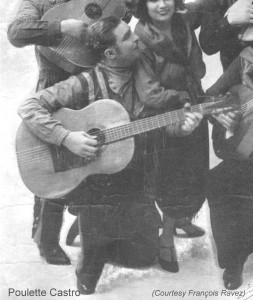
Baro recorded extensively during the thirties mostly as a rhythm guitarist with the Quintette of the Hot Club of France but also with his brothers, Sarane and Matelo. Yet the last recording he made with Django was in February, 1940 as part of "Django’s Music" and he hardly recorded during the war at all. There is no record of him performing with the New Quintet or being part of Django’s wartime success in France. It is as if this stage in Django’s musical development left Baro behind or in some way alienated him. Perhaps it was at this point that he finally decided he could not keep pace with Django and as a result, became disaffected with music in general. Perhaps that feeling was exacerbated by the lure of the lucrative opportunities offered by the black market. Whatever the reason, the next time we hear of Baro is in 1949 when he made his much lauded series of recordings with Jo Privat; the recordings which really define him.
It has been said that Django and Baro were friends but also great musical rivals. I do not believe the latter was true at all. There are stories that when they were young and learning to play, they would go round to Poulette Castro’s caravan together for some rudimentary "lessons", and it may be that in those early days, there was an element of rivalry between them. However, during his lifetime, Django became an internationally famous jazz guitarist thought by many to be the greatest non-classical guitarist ever. Baro, or as he was normally referred to in those days, Pierre, was hardly known in France outside of Paris. Why would Django Reinhardt consider him a rival? Additionally, although incredibly talented, Baro Ferret was not a convincing jazz soloist and jazz was the music Reinhardt really cared about. Neither was Baro a particularly good improviser; his solos tending to be extensively rehearsed and pre-prepared. Very little exists of Baro as a featured conventional jazz soloist but on "Swing Cocktail" with Gus Viseur’s Music, his solo is far from convincing and it does not really swing. There is no doubt that Django was fully aware of his own talent and when he met Marcel Cerdan in New York in 1946 and the boxer told him about an injury he had, Django showed him his own damaged left hand as a comparison and said "….. but I am still the greatest guitarist in the world". Gerard Leveque is quoted as saying of Django "He was always delighted with his own playing. He’d sit there saying "Aren’t I great? How well I’m playing here. Just listen to this!" He believed himself to be the greatest and he was." I do not think Django considered Baro Ferret or any other guitarist to be his rival. It may well be that Baro perceived things differently and, for a while, felt he could compete with Django but ultimately, he did have to admit that although he believed he was as technically competent as Django, he could not keep pace with his incredible creativity. "Django’s technique does not scare me…… it’s what he has in his brain that scares me." Partly as a result of this realisation together with his increasing involvement in criminal activities, Baro Ferret withdrew more and more from playing the guitar and performing in public. Django’s international fame and his own lack of recognition may also have been a factor.
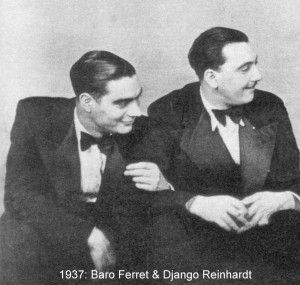
Django Reinhardt was a fascinating character full of deep anxieties and complexities, someone we will never truly understand. Baro Ferret was, from a different perspective, equally as fascinating although, sadly, our knowledge of him is only rudimentary. Even his friends were unsure where he actually lived and unusually for a gypsy, he never married. In many ways, I see him as an enigma in same the way I see his music as enigmatic; full of drama, unexpected stabs and obscure directions, often dissonant, angular, almost harsh. A man who did not have the musical genius of Django Reinhardt but who was still an incredibly talented guitarist and a man who arguably squandered that talent with his choice of lifestyle. One might contend that, like Oscar Aleman, Baro Ferret was unfortunate to be around at the same time as the unique creativity of Django Reinhardt which inevitably overshadowed him. The contrary view is that had Django’s fame not focussed attention on Paris in the 1930’s and 1940’s, Baro Ferret may have never been heard outside of a small Parisian clique or even the gypsy community itself. One thing I think we can be sure of is that Django Reinhardt was essentially a guitarist who by the nature of his upbringing, his profession and the times he lived in touched the edges of the criminal underworld. His friend Baro Ferret, on the other hand, was a professional criminal who also happened to play the guitar, but they were both fascinating individuals and they produced some wonderful music together; music that will never be forgotten.
Notes
- The information and photographs in this article have been collected over many years from a variety of different sources. However, I would like to particularly thank Dr François Ravez and Scot Wise for their help in putting this piece together. My thanks also go to Alain Antonietto, Michel Mercier, Marc Masselin and Chris Goddard.
- Baro Ferret soloing on "Swing Cocktail" by Gus Viseur’s Music. – https://www.youtube.com/watch?v=Q80JOqwiVhY








